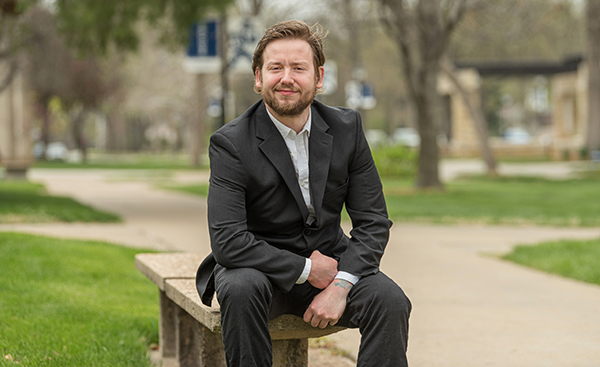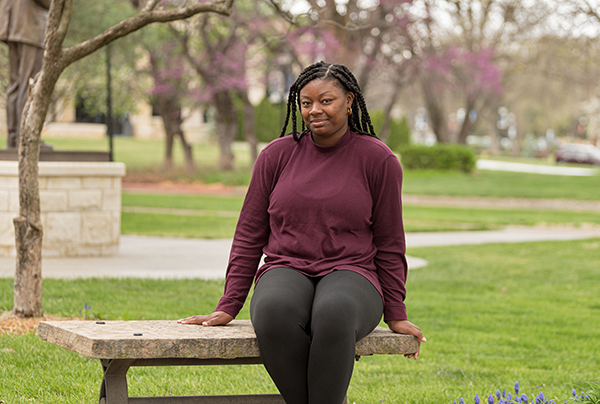No Longer Alone
Former foster youth find stability, support system at Washburn

From The Ichabod - Spring 2021
By Jeremy Wangler
Stormy Lukasavage’s life went from daily fist fights to fighting for the needs of foster youth. In between those transformative years came a degree from Washburn University, something only 2-4% of former foster youth in the United States receive, according to some studies.
Lukasavage, bs ’19, grew up without stable living most of his life and was in a group home the final two years of his childhood, including his freshman year at Washburn when he was 17.
“I legitimately had to fight every day, and I'm not talking about metaphorically,” he said. “I'm talking about throwing my fist into other people in order to get the same things as kids who don't know the struggle kids in the foster care system have daily.
“From my perspective, education became a way out.”
He graduated high school a year early, moved to on-campus housing his second year and got very involved. Classmates, faculty and staff became the stable support he never had. He now has a degree in criminal justice and works in Topeka as a consultant for a national agency supporting foster youth.
Sherika Carey, certificate ’20, knew education was also her way out of the foster system. Growing up, she took note of the successful adults around her and the ones who weren’t living up to their potential.

“If I want to be like the successful ones, how do I get there?” Carey would ask herself. “I told myself when I was 14 or 15 failure wasn't an option. That is one of the reasons I came to college.”
She earned a medical office assistant certificate from Washburn University Institute of Technology and is taking classes to earn a bachelor's degree and become a registered nurse. Living on campus has provided her with solid relationships.
“Residential Living was my main support system,” Carey said. “They didn't really treat me any differently than anybody else, but they were there when I needed them, and they're still there if I need them.”
Foster youth are part of a system throughout their childhood, and then as adults, the opportunities become voluntary. Shanelle Dupree, jd ’07, is a regional director for the Kansas Department for Children and Families. She manages 450 employees spread between Kansas City and Lawrence and oversees foster care and other social services.
“We're not there to be in their lives forever, but we are there to absolutely help families when, usually, they're at their worst moment,” Dupree said. “We have to remember foster youth experienced trauma either their entire life or toward the end of their childhood. Sometimes, when they age out, they're sick of us. They're sick of the system. They're sick of anyone who is an authority telling them what to do and how to do it.”
For those who do seek higher education, they may just want to blend in with everyone else. Not every foster youth comes forward when attending Washburn.
“It's been one-on-one interactions because it is hard to identify those students unless they self-disclose,” said Jared Dechant, ba ’15, assistant director of Residential Living. “They don't want people to think differently of them. We do our best with what we know.”
Lukasavage said the hardest part of college was when other students went home for breaks.
“When the holidays came and everyone else was looking forward to being able to go home and be with their families, eat huge Thanksgiving feasts, have all these lavish Christmas presents, I wasn't afforded any of those opportunities because I didn't have that in my life,” Lukasavage said.
He ended up building a family with the people in the residence halls, and he credits them with his college success. Dupree and Dechant hope more people become aware of the unique needs of foster youth transitioning into college and the stigma is erased from this non-traditional group of students.
“Think about when you were going to your first day of college,” Dupree said. “Most people had a parent or a loved one who would drop them off at the dorms. I know I did, and I remember I was scared out of my mind. I spent the first night crying, thinking, ‘I don't know if I can do this.’ But then that next day, I got a call from my mom, and we talked, and I knew I could do it. A child who has aged out of foster care may not have outside positive support, and that needs to change.”
Residential Living now has a program called Non Nobis Solum that raises money and collects donations to help meet the extra needs of any student who may not have a support system when residence halls close.
“Some of those funds will help with paying for their nightly stays during those days,” Dechant said. “Sometimes, we can put together food and care packages. We use our resources on campus and help them get connected.”